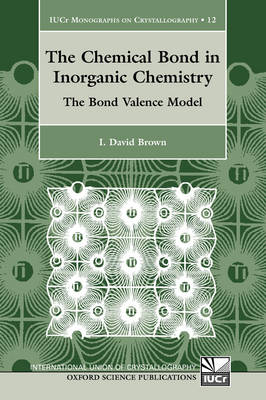
The Chemical Bond in Inorganic Chemistry
Seiten
2002
Oxford University Press (Verlag)
978-0-19-850870-0 (ISBN)
Oxford University Press (Verlag)
978-0-19-850870-0 (ISBN)
- Titel ist leider vergriffen;
keine Neuauflage - Artikel merken
Describes the bond valence model, and shows how it can be applied to synthetic and solution chemistry. This book emphasizes the separate roles of the constraints of chemistry and of three-dimensional space by analysing the chemistry of solids. Many applications of the model in physics, materials science, chemistry, and more are reviewed.
This book describes the bond valence model, a description of acid-base bonding which is becoming increasingly popular particularly in fields such as materials science and mineralogy where solid state inorganic chemistry is important. Recent improvements in crystal structure determination have allowed the model to become more quantitative. Unlike other models of inorganic chemical bonding, the bond valence model is simple, intuitive, and predictive, and can be used for analysing crystal structures and the conceptual modelling of local as well as extended structures. This is the first book to explore in depth the theoretical basis of the model and to show how it can be applied to synthetic and solution chemistry. It emphasizes the separate roles of the constraints of chemistry and of three-dimensional space by analysing the chemistry of solids. Many applications of the model in physics, materials science, chemistry, mineralogy, soil science, surface science, and molecular biology are reviewed. The final chapter describes how the bond valence model relates to and represents a simplification of other models of inorganic chemical bonding.
This book describes the bond valence model, a description of acid-base bonding which is becoming increasingly popular particularly in fields such as materials science and mineralogy where solid state inorganic chemistry is important. Recent improvements in crystal structure determination have allowed the model to become more quantitative. Unlike other models of inorganic chemical bonding, the bond valence model is simple, intuitive, and predictive, and can be used for analysing crystal structures and the conceptual modelling of local as well as extended structures. This is the first book to explore in depth the theoretical basis of the model and to show how it can be applied to synthetic and solution chemistry. It emphasizes the separate roles of the constraints of chemistry and of three-dimensional space by analysing the chemistry of solids. Many applications of the model in physics, materials science, chemistry, mineralogy, soil science, surface science, and molecular biology are reviewed. The final chapter describes how the bond valence model relates to and represents a simplification of other models of inorganic chemical bonding.
Dr. Ian David Brown, Brockhouse Institute for Materials Research, McMaster University, Hamilton, Ontario, Canada L8S 4MI. Email: idbrown@mcmaster.ca
1. HISTORICAL INTRODUCTION ; 2. THE IONIC BOND ; 4. ANION AND CATION BONDING STRENGTHS ; 10. SPACE AND SPACE GROUPS ; 13. APPLICATIONS
| Erscheint lt. Verlag | 1.2.2002 |
|---|---|
| Zusatzinfo | numerous tables and figures |
| Verlagsort | Oxford |
| Sprache | englisch |
| Themenwelt | Naturwissenschaften ► Biologie ► Genetik / Molekularbiologie |
| Naturwissenschaften ► Chemie ► Anorganische Chemie | |
| Naturwissenschaften ► Chemie ► Physikalische Chemie | |
| Naturwissenschaften ► Geowissenschaften ► Geologie | |
| Naturwissenschaften ► Geowissenschaften ► Mineralogie / Paläontologie | |
| Naturwissenschaften ► Physik / Astronomie ► Festkörperphysik | |
| Technik ► Maschinenbau | |
| ISBN-10 | 0-19-850870-0 / 0198508700 |
| ISBN-13 | 978-0-19-850870-0 / 9780198508700 |
| Zustand | Neuware |
| Haben Sie eine Frage zum Produkt? |
Mehr entdecken
aus dem Bereich
aus dem Bereich
50 Meilensteine der Genetik
Buch | Hardcover (2022)
Librero b.v. (Verlag)
CHF 13,90


